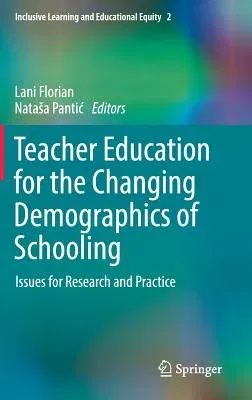Teacher Education for the Changing Demographics of Schooling: Issues for Research and Practice (2017)Hardcover - 2017, 21 April 2017

Qty
1
Turbo
Ships in 2 - 3 days
In Stock
Free Delivery
Cash on Delivery
15 Days
Free Returns
Secure Checkout

Part of Series
Inclusive Learning and Educational Equity
Print Length
241 pages
Language
English
Publisher
Springer
Date Published
21 Apr 2017
ISBN-10
3319543881
ISBN-13
9783319543888
Description
Product Details
Book Edition:
2017
Book Format:
Hardcover
Country of Origin:
NL
Date Published:
21 April 2017
Dimensions:
23.39 x
15.6 x
1.6 cm
Genre:
Physically Challenged
ISBN-10:
3319543881
ISBN-13:
9783319543888
Language:
English
Location:
Cham
Pages:
241
Publisher:
Weight:
530.7 gm